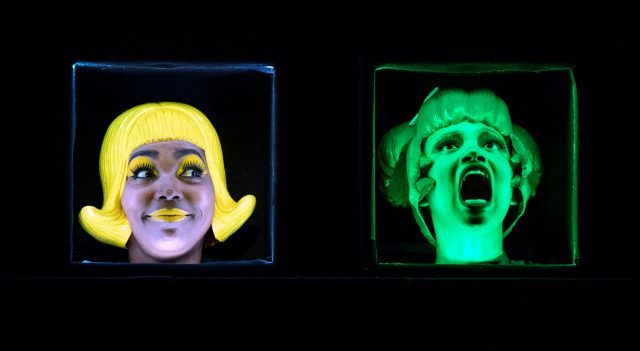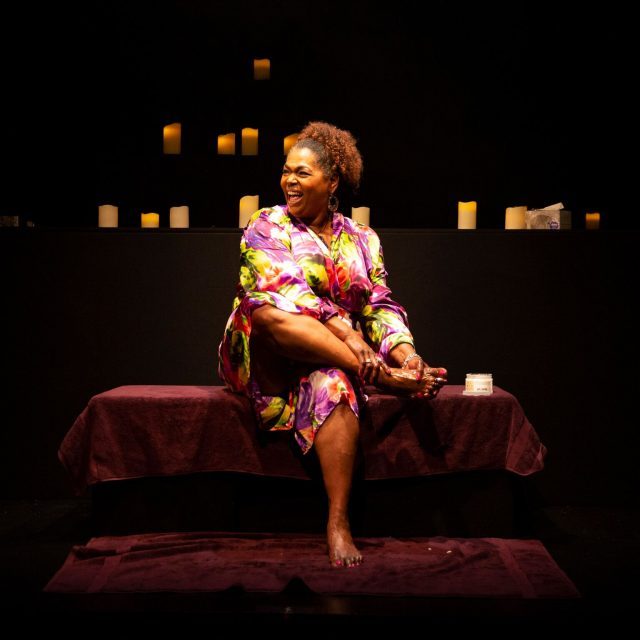
Liz Mikel and Kiersey Clemons play items on a shelf in Eve Ensler’s Pomegranate (photo by Maria Baranova)
Lucille Lortel Theatre
121 Christopher St. between Bleecker & Hudson Sts.
Tuesday – Sunday through June 23, $65-$85
212-352-3101
abingdontheatre.org/fruit-trilogy
Activist and writer Eve Ensler follows up her powerful, intimate one-woman show, In the Body of the World, with the New York premiere of Fruit Trilogy, three short experimental pieces that are still in need of some ripening. The Abingdon Theatre Company production, running at the Lucille Lortel through June 23 — coincidentally, Ensler was just given a lifetime achievement honor at last month’s Lucille Lortel Awards — explores major themes from throughout Ensler’s oeuvre, investigating female oppression and empowerment and the body itself, beginning with her 1986 international hit, The Vagina Monologues. Fruit Trilogy opens with the Beckett-like Pomegranate, in which Item 1 (Liz Mikel) and Item 2 (Kiersey Clemons) portray a pair of women on a shelf in a warehouse, only their heads visible in small black boxes. On display for men to purchase and do with what they want, they discuss their situation: “Women? We are items that they want to buy,” Item 1 says. “We are women more willing to be vile receptacles than we are willing to be dead,” Item 2 explains. Discussing hope, Item 1 declares, “My body will not live without possibility.” Item 2 sarcastically replies, “You have a body?”

Kiersey Clemons is a young sex slave trapped in a cage in Eve Ensler’s Avocado (photo by Maria Baranova)
In Avocado, Clemons plays a sex slave slithering across a raised narrow platform in a container that serves as a cage, though the bars are unseen. She prowls about like a wild animal, speaking directly to the audience. At one point, she says, “Do you see them? Such naughty angels, jokester angels, protecting me, protecting all the girls who lost their bodies.” She goes into graphic detail about her victimization, brutalization, and enslavement, her story lightened only by an unexpected connection in one encounter, with a deaf, nonverbal boy who treats her more like a person, than a prostitute. The woman has sold herself one last time for passage in the container to a place called Asylum, the kind of freedom offered by City of Joy, a securely walled and guarded safe space cofounded by Ensler in Bukavu in the Eastern Democratic Republic of Congo where survivors of rape and sexual violence come to get their life back, learning to reclaim their bodies and their minds.

Liz Mikel treats herself special in Coconut, the conclusion of Fruit Trilogy (photo by Maria Baranova)
And in Coconut, Mikel invites the audience into her bathroom, lit by candles, where she luxuriously and ceremonially rubs coconut oil onto her right foot, taking control of her body in ways that the characters in the previous two tales could not. “Like everything else, this body only existed in relationship to the person who was touching it, as a thing that might be touched,” she says. Now that person is her, rejecting all the ways she previously didn’t “measure up” to others, being a large black woman judged by her size, gender, and race. “We’re engaged in a transformative process of emollient change,” she says as she rubs the pain of memory and shame out of her body. When she disrobes, she takes pride in her naked body, daring the audience to look at her, to experience her, to join her in a happier world. Clemons (Dope, The Only Boy Living in New York) and Mikel (Lysistrata Jones, Friday Night Lights) are engaging, fearless performers, but director Mark Rosenblatt (The Country, Animal Wisdom) can’t get a firm enough grasp of the material or of Mark Wendland’s (Significant Other, Next to Normal) dark, low-budget sets, which are indeed somewhat confusing. Although it takes on some tough, serious topics, the trilogy is too long at eighty minutes, with too much repetition in the overly clever dialogue that continues well after the point has been made. It feels like Fruit Trilogy is still at the workshop stage, requiring additional care and nurturing before being picked and served to the public. Several of the remaining performances will be followed by talkbacks with Ensler (The Good Body, Emotional Creature) and special guests, focusing on not only the play itself but Ensler’s work with V-Day, “a global activist movement to end violence against women and girls” that she cofounded in 1998.